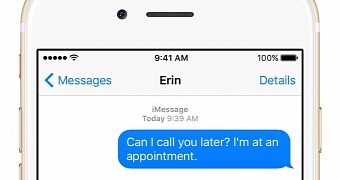One of the new iOS 11 features that Apple announced at WWDC earlier this month concerned iMessage, as iPad, iPhone, and Mac owners can now have their messages fully synchronized across devices with the power of cloud.
And while this is without a doubt a major update for users who are entirely committed to the Apple ecosystem, it also raises concerns as to what level of privacy this feature can provide, especially because messages are first transferred to the cloud before they are pushed back to devices once again.
In an interview with Daring Fireball, Apple Senior Vice President of Software Engineering Craig Federighi has said the encryption tech that Cupertino is using for this feature makes it impossible to read messages sent and synchronized via iMessage, not only by hackers or authorities, but even by Apple itself.
Basically, once the feature is configured and devices are enrolled for synchronization, encryption keys are automatically generated and are only shared between devices, with Apple not having access to them. This means that even if it wants to, Apple cannot access the content that’s synced with this feature, Federighi said.
“Our security and encryption team has been doing work over a number of years now to be able to synchronize information across your, what we call your circle of devices - all those devices that are associated with the common account - in a way that they each generate and share keys with each other that Apple does not have,” he explained.
“And so, even if they store information in the cloud, it's encrypted with keys that Apple doesn't have. And so [users] can put things in the cloud, they can pull stuff down from the cloud, so the cloud still serves as a conduit - and even ultimately kind of a backup for them - but only they can read it.”
The hacker-proof iPhone
Back in 2016, a dispute between Apple and the FBI raised questions as to whether the company should break into a device allegedly used by one of the San Bernardino hackers, especially because the device was believed to store evidence and information regarding other terrorist groups.
Apple refused to unlock the device amid security concerns, but instead said it could only extract iCloud data, at the same time pledging to build a device that would boost security and privacy to a level that makes it impossible even for this method to work.
A hacker-proof iPhone is yet to be created, though with every new iOS release, Apple adds new security features that make it harder for the company itself, and consequently for hackers and governments, to break into its devices and access the data.
The new iMessage feature will become available to all users with the release of iOS 11 in the fall, as the company is still running a beta program right now to fix bugs and improve features.

 14 DAY TRIAL //
14 DAY TRIAL //